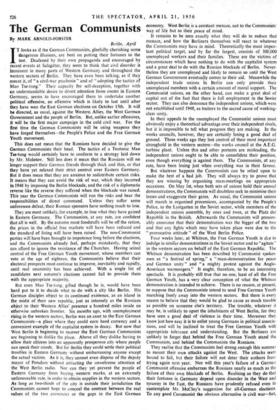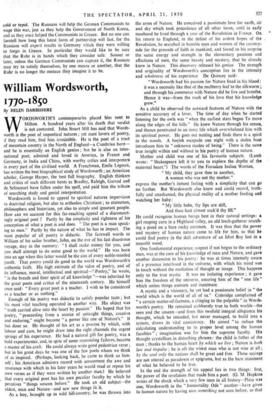The German Communists
By MARK ARNOLD-FORSTER Berlin, April
IT looks as if the German Communists, gleefully cherishing some dangerous illusions, are bent on putting their fortunes to the test. Deafened by their own propaganda and encouraged by recent events at Salzgitter, they seem to think that civil disorder is imminent in many parts of Western Germany and throughout the western sectors of Berlin. They have even been talking, as if they meant it, of " a civil-war psychosis " and of " adopting the tactics of Mao Tse-tung." Their capacity for self-deception, together with an understandable desire to divert attention from events in Eastern Germany, seems to have encouraged them to undertake another political offensive, an offensive which is likely to last until after they have won the East German elections on October 15th. It will be directed, as usual, against the Western Allies, the West German Government and the people of Berlin. But, unlike earlier offensives, it will be the first major campaign in the cold civil war. For the Arst time the German Communists will be using weapons they have forged themselves—the People's Police and the Free German Youth movement.
This does not mean that the Russians have decided to give the German Communists their head. The tactics of a Teutonic Mao Tse-tung would certainly have to conform to a strategy laid down by Mr. Molotov. Still less does it mean that the Russians will no longer support their German friends through thick and thin, or that they have yet relaxed their strict control over Eastern Germany. But it does mean that they are anxious to redistribute certain risks. It means that they can avoid the risk of war, which they incurred in 1948 by imposing the Berlin blockade, and the risk of a diplomatic reverse like the reverse they suffered when the blockade was raised. This year the German Communists will run the risks and bear the responsibilities of direct command. Unless they suffer some unforeseen defeat, their Russian sponsors have nothing much to lose.
They are most unlikely, for example, to lose what they have gained in Eastern Germany. The Communists, at any rate, are confident that all is well. By the autumn most foodstuffs will be off the ration, the prices in the official free markets will have been reduced and the standard of living will have been raised. The non-Communist parties will have been brought to impotence long before the elections, and the Communists already feel, perhaps mistakenly, that they can afford to ignore the resistance of the Churches. Having seized control of the Free German Youth movement, whose members can , vote at the age of eighteen, the Communists believe that their electoral prospects must continue to improve, inevitably and rapidly, until real unanimity has been achieved. With a single list of candidates next autumn's elections cannot fail to provide them with the appropriate majority.
But even Mao Tse-tung, gifted though he is, would have been hard put to it to decide what to do with a city like Berlin. His German disciples object to its continued existence, as an island in the midst of their new republic, just as intensely as the Russians object to their Western Allies' presence a hundred miles inside an otherwise unbroken frontier. Six months ago, with unemployment rising in the western sectors, Berlin was an asset to the-East German Communists—a place where they could earn hard currency and a convenient example of the capitalist system in decay. But now that West Berlin is beginning to recover the East German Communists are beginning to dislike the place. Above all they dislike having to allow their citizens into an apparently prosperous city where people can speak their minds. But for Berlin they could settle their political troubles in Eastern Germany without embarrassing anyone except the actual victims. As it is, they cannot even dispose of the deputy mayor of Potsdam without attracting the unwelcome attention of the West Berlin radio. Nor can they yet prevent the people of Eastern Germany from buying western marks, at an extremely unfavourable rate, in order to obtain supplies in the western sectors. As long as two-thirds of the city is outside their jurisdiction the Communists cannot hope to conceal the contrast between the real values of the two currencies or the gaps in the East German economy. West Berlin is a constant menace, not to the Communists' way of life but to their peace of mind.
It remains to be seen exactly what they will do to reduce that menace, and how the Berliners themselves will react to whatever the Communists may have in mind. Theoretically the most impor- tant political target, and by far the largest, consists of 300,000 unemployed workers and their families. These are the victims of circumstances which have nothing to do with the capitalist system and a great deal to do with the Russian blockade of Berlin. Never- theless they are unemployed and likely to remain so until the West German Government eventually comes to their aid. Meanwhile the independent trade unions In Berlin can only provide their unemployed members with a certain amount of moral support. The Communist unions, on the other hand, can make a great deal of capital out of the fact that there is full employment in the Soviet sector. They can also denounce the independent unions, which were not established until 1948, as traitors to the sacred cause of working- class unity.
In their appeals to the unemployed the Communist unions must obviously enjoy a theoretical advantage over their independent rivals, but it is impossible to tell what progress they are making. In the works councils, however, they are certainly losing a good deal of ground. Three weeks ago they lost control of their most important stronghold in the western sectors—the works council at the A.E.G. turbine plant. Unless this and other portents are misleading, the independent unions ought to be able to consolidate their position, even though everything is against them. The Communists, at any rate, have been losing just when everything was in their favour.
But whatever happens the Communists can be relied upon to make the best of a bad job. They will always try to prove that they are winning 'by organising mass-meetings on appropriate occasions. On May 1st, when both sets of unions hold their annual demonstrations, the Communists will doubtless seek to minimise their losses and exaggerate their gains. As usual, the Communist unions will march in organised processions, accompanied by the People's Police, to the Lustgarten in the Soviet sector, while members of the independent unions assemble, by ones -and iwos, at the Platz der Republik in the British. Afterwards the Communists will presum- ably announce that their demonstration was the bigger of the two and that any fights which may have taken place were due to the " provocative attitude " of the West Berlin Police.
Four weeks later, at Whitsun, the Free German Youth is due to indulge in similar demonstrations in the Soviet sector and to."agitate" in the western sectors on behalf of the East German Republic. The Whitsun demonstration has been described by Communist spokes- men as " a festival of spring," a " mass-demonstration for peace and German unity " and " a mighty protest against the Anglo- American warmongers." It ought, therefore, to be an interesting spectacle. It is probably still true that no one, least of all the Free German Youth, has a very clear conception of what the Whitsun demonstration is intended to achieve. There is no reason, at present, to suppose that the Communists intend to send Free German Youth marching freely away into the western sectors. But there is every reason to believe that they would be glad to cause as much trouble as possible on someone else's territory. The trouble, whatever it may be, is unlikely to upset the inhabitants of West Berlin, for they have seen a good deal of violence in their time. Moreover they know just how easy it is to enlist young Germans in political associa- tions, and will be inclined to treat the Free German Youth with appropriate tolerance and understanding. But the Berliners are unlikely to forget that behind the Free German Youth stand the Communists, and behind the Communists the Russians.
They realise that the Communists feel strong enough this summer to mount their ovyn attacks against the West. The attacks seem bound to fail, but their failure will not deter their authors from trying again next year. Nor will this year's failure of a German Communist offensive embarrass the Russians nearly as much as the failure of their own blockade of Berlin. Realising as they do that their fortunes in Germany depend upon disorder in the West and tyranny in the Eat, the Russians have prudently refused even to contemplate Mr. McCloy's suggestion for all-German elections. To any good Communist the obvious alternative is civil war—hot,
cold or tepid. The Russians will help the German Communists to wage this war, just as they help the Government of North Korea, and as they once helped the Communists in Greece. But no one can foretell how long this latest form of partnership will last, for the Russians will expert results in Germany which they were willing to forgo in Greece. In particular they would like to be sure that the Ruhr is in hands which they consider safe. Sooner or later, unless the German Communists can capture it, the Russians may try to satisfy themselves, by one means or another, that the Ruhr is no longer the menace they imagine it to be.







































 Previous page
Previous page